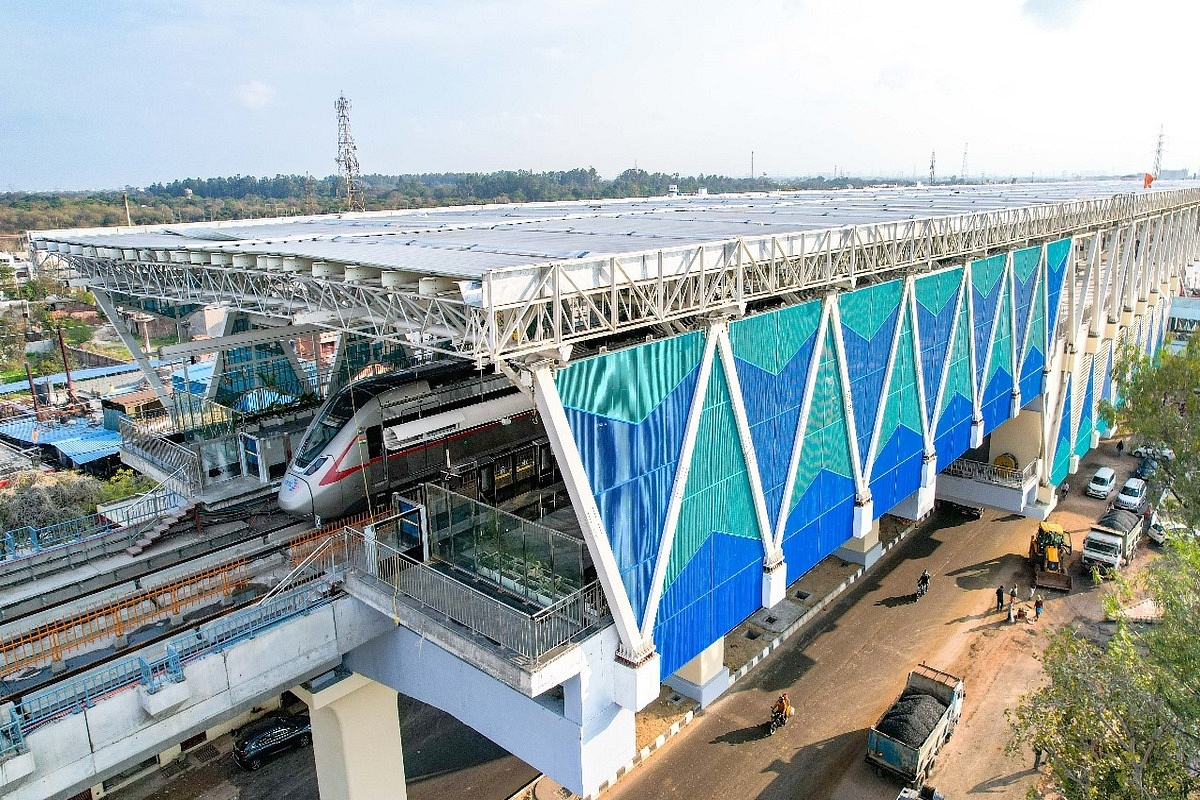Infrastructure
Steering Back Onto Track: RRTS Derailment Explained
- While the recent accident may have dented the otherwise impeccable safety record of the RRTS project, it should not be a cause for alarm.

The Delhi-Meerut RRTS.
The country's first regional rapid train between Delhi and Meerut has hit the headlines, albeit regrettably, for an unexpected cause.
On 9 March, during testing and commissioning, two wheels of an axle slipped off the tracks, causing a derailment at Duhai Depot in Uttar Pradesh.
A high-level inquiry committee of technical experts constituted by the National Capital Region Transport Corporation (NCRTC), overseeing the project, identified operational negligence on the part of the staff as the cause.
"The incident occurred during movement of the train in the maintenance depot due to an operational lapse on the part of the staff," NCRTC said in response to queries from ET without naming the company or officials held accountable.
"In this case, some of the provisions of the prescribed standard operating procedures (SOPs) were not observed. The responsibility of the concerned operational staff has been fixed," the company said.
Additionally, NCRTC clarified that the derailment did not happen on the active part of the Regional Rapid Transit System (RRTS) corridor. The Delhi-Meerut RRTS corridor spans 82 km, with 34 km currently in operation, incorporating eight stations from Sahibabad to Modinagar North.
A New Operational Philosophy
In July 2022, DB International Operations (DB IO), a subsidiary of the German firm Deutsche Bahn, was awarded a 12-year multi-million-euro contract to operate and maintain India’s first high-speed commuter service, with an option to extend for five more years.
Following the signing, DB RRTS Operations India Private Limited was established as the operating company for the project.
The Delhi project was the second major international passenger transport project secured by DB IO in 2022, following a contract for planning, operating, and maintaining passenger rail transport in the Toronto metropolitan area.
Although the expertise of DB IO cannot be called into question based on this one incident, it does highlight the need to review established safety protocols and SOPs thoroughly.
In response to the findings, NCRTC has already taken corrective measures recommended by the expert committee. This includes penalising the staff involved and providing intensive refresher courses to update their knowledge about the SOPs.
Branded as Namo Bharat, the Delhi-Meerut RRTS corridor is set to cover 82 kilometres, connecting Delhi, Ghaziabad, and Meerut, a densely populated region with more than 46 million residents.
The foundation stone for the project was laid by Prime Minister Narendra Modi on 8 March 2019. While 34 km of the project have been completed in just 4.5 years, which is a remarkable achievement, the remaining portion is ready for commissioning in the next six months, nine months ahead of schedule.
Once fully commissioned, it will feature 25 stations and two depots, catering to the needs of approximately 800,000 passengers daily — comparable to the capacity of Hamburg’s S-Bahn rail system.
While the recent accident may have dented the otherwise impeccable safety record of the RRTS project, it should not be a cause for alarm.
Achieving the highest safety standards is an ongoing process — every incident provides an opportunity to learn and improve safety measures to prevent future occurrences.
Support Swarajya's 50 Ground Reports Project & Sponsor A Story
Every general election Swarajya does a 50 ground reports project.
Aimed only at serious readers and those who appreciate the nuances of political undercurrents, the project provides a sense of India's electoral landscape. As you know, these reports are produced after considerable investment of travel, time and effort on the ground.
This time too we've kicked off the project in style and have covered over 30 constituencies already. If you're someone who appreciates such work and have enjoyed our coverage please consider sponsoring a ground report for just Rs 2999 to Rs 19,999 - it goes a long way in helping us produce more quality reportage.
You can also back this project by becoming a subscriber for as little as Rs 999 - so do click on this links and choose a plan that suits you and back us.
Click below to contribute.
Latest